2019人教版八年级下册英语Unit5知识点总结
- 格式:pdf
- 大小:288.84 KB
- 文档页数:11

Unit5 What were you doing when the rainstorm came?1.过去进行时定义:表示在过去某一时刻或过去某一段时间内正在进行的动作。
结构:was/were+ v.ing句型结构:肯定句:主语+was/were+ v.ing…..否定句:主语+was/were+not+ v.ing….一般疑问句:Was/Were+主语+v.ing…….?回答:Yes,主语+was/were.No, 主语+wasn’t/weren’t.时间标志词:at this time yesterday, at that time, at nine+过去的时间,when, while等引导的时间状语从句等。
2.When与while的区别:while引导的时间状语从句只表示时间段,while要与延续性动词、表状态的词或进行时态连用。
While 还可以表示“然而,却”,对比关系。
When既可以与延续性动词连用,也可以与短暂性动词连用。
也可与过去时态和进行时态连用。
但是当两个动作同时发生时用While,不用when。
(I was doing my homework while my sister was playing.)3.beat与win的区别:beat意为“打败”,后接比赛的对手、队伍、团体。
过去式beat Win意为“获胜,赢得”,后接比赛、奖品、荣誉等。
过去式won,4.句型:find it+adj+(for sb)+ to do sth 发现做某事对于某人来说。
Find sb/sth doing sth 发现。
正在做某事。
5.全部否定:当句子含有否定词no, none, nobody, nothing, nowhere,neither, never等表达绝对否定含义的时候,叫全部否定。
例如:Nobody knows her. 没有一个人认识她。
部分否定:当含有全体意义的代词或副词all, each, every, both,, always ,often,等用于否定式谓语的句子中的时候,构成部分否定。
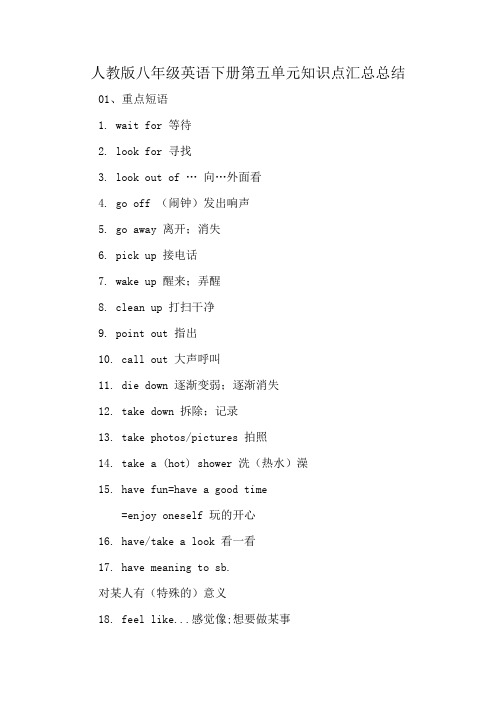
人教版八年级英语下册第五单元知识点汇总总结01、重点短语1. wait for 等待2. look for 寻找3. look out of … 向…外面看4. go off (闹钟)发出响声5. go away 离开;消失6. pick up 接电话7. wake up 醒来;弄醒8. clean up 打扫干净9. point out 指出10. call out 大声呼叫11. die down 逐渐变弱;逐渐消失12. take down 拆除;记录13. take photos/pictures 拍照14. take a (hot) shower 洗(热水)澡15. have fun=have a good time=enjoy oneself 玩的开心16. have/take a look 看一看17. have meaning to sb.对某人有(特殊的)意义18. feel like...感觉像;想要做某事19. make sure 务必,确保20. beat against 敲打21. fall asleep 进入梦乡22. break … apart 使…支离破碎23. turn on打开 (反:turn off关上)24. listen to the radio 听收音机25. get to = arrive in/at 到达26. make one’s way to 前往;费力前行27. to tell the truth 说实话28. walk by 路过29. at the time of …在…的时候30. in a mess 凌乱不堪;乱七八糟31. in times of difficulty 在困难时期32. because of 因为33. in history 在历史上34. in silence 沉默,无声35. at first 起初;起先36. by the side of …在…旁边37. the rest of …剩余的38. each other 互相39. for example 例如40. as well 也02、重点句子Grammar Focus 句子1. What were you doing at eight last night?昨天晚上8点你在做什么?I was taking a shower.我在洗淋浴。
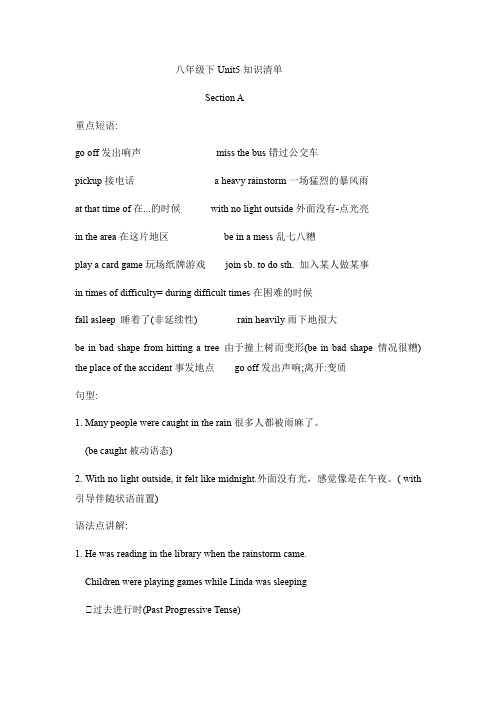
八年级下Unit5知识清单Section A重点短语:go off发出响声miss the bus错过公交车pickup接电话 a heavy rainstorm一场猛烈的暴风雨at that time of在...的时候with no light outside外面没有-点光亮in the area在这片地区be in a mess乱七八糟play a card game玩场纸牌游戏join sb. to do sth. 加入某人做某事in times of difficulty= during difficult times在困难的时候fall asleep 睡着了(非延续性) rain heavily雨下地很大be in bad shape from hitting a tree 由于撞上树而变形(be in bad shape 情况很糟) the place of the accident事发地点go off发出声响;离开:变质句型:1. Many people were caught in the rain很多人都被雨麻了。
(be caught被动语态)2. With no light outside, it felt like midnight.外面没有光,感觉像是在午夜。
( with 引导伴随状语前置)语法点讲解:1. He was reading in the library when the rainstorm came.Children were playing games while Linda was sleeping①过去进行时(Past Progressive Tense)定义:表示在过去某一时刻或某一段时间正在进行的动作。
这一特定的过去时间除有上下文暗示以外,一般用时间状语来表示。
构成: was\were+ v-ingI was taking a shower at 8 last night.He was reading in the library when the rainstorm came.Jenny was helping Mary with her homework while Linda was sleeping.①when和while在过去进行时态当中的区别while引导的时间状语从句,其谓语动词只能是延续的如work, watch,study... 而When其后既可跟延续性动词,也可跟非延续性动词,如come,go.while后常引导过去进行时态,when 后面常引导一般过去时。
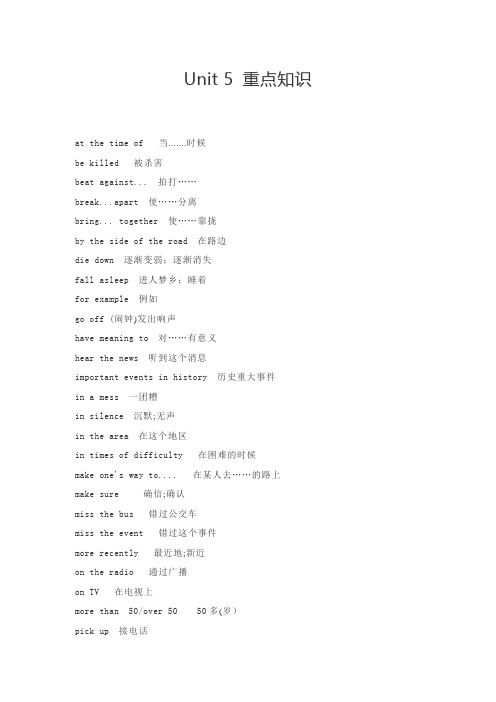
Unit 5 重点知识at the time of 当.......时候be killed 被杀害beat against... 拍打……break...apart 使……分离bring... together 使……靠拢by the side of the road 在路边die down 逐渐变弱;逐渐消失fall asleep 进人梦乡;睡着for example 例如go off (闹钟)发出响声have meaning to 对……有意义hear the news 听到这个消息important events in history 历史重大事件in a mess 一团糟in silence 沉默;无声in the area 在这个地区in times of difficulty 在困难的时候make one's way to.... 在某人去……的路上make sure 确信;确认miss the bus 错过公交车miss the event 错过这个事件more recently 最近地;新近on the radio 通过广播on TV 在电视上more than 50/over 50 50多(岁)pick up 接电话remember doing sth. 记得做过某事remember to do sth. 记得去做某事take a hot shower 洗热水澡take down 拆除;摧毁the Animal Helpline 动物保护热线the World Trade Center 世贸中心try doing sth. 尝试做某事try to do sth. 努力做某事wake up 醒来;叫醒……walk by 走路经过词法精选1.when和while的区别(1)表示“当……的时候”,如后面连接的动词为进行时态,则用while多于用when。
而when通常与瞬间性动词或延续性不强的动词连用。
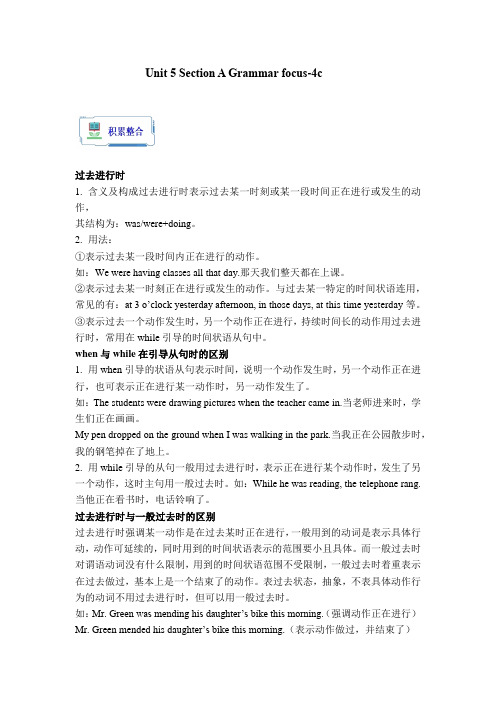
Unit 5 Section A Grammar focus-4c过去进行时1.含义及构成过去进行时表示过去某一时刻或某一段时间正在进行或发生的动作,其结构为:was/were+doing。
2.用法:①表示过去某一段时间内正在进行的动作。
如:We were having classes all that day.那天我们整天都在上课。
②表示过去某一时刻正在进行或发生的动作。
与过去某一特定的时间状语连用,常见的有:at 3 o’clock yesterday afternoon, in those days, at this time yesterday等。
③表示过去一个动作发生时,另一个动作正在进行,持续时间长的动作用过去进行时,常用在while引导的时间状语从句中。
when与while在引导从句时的区别1.用when引导的状语从句表示时间,说明一个动作发生时,另一个动作正在进行,也可表示正在进行某一动作时,另一动作发生了。
如:The students were drawing pictures when the teacher came in.当老师进来时,学生们正在画画。
My pen dropped on the ground when I was walking in the park.当我正在公园散步时,我的钢笔掉在了地上。
2.用while引导的从句一般用过去进行时,表示正在进行某个动作时,发生了另一个动作,这时主句用一般过去时。
如:While he was reading, the telephone rang.当他正在看书时,电话铃响了。
过去进行时与一般过去时的区别过去进行时强调某一动作是在过去某时正在进行,一般用到的动词是表示具体行动,动作可延续的,同时用到的时间状语表示的范围要小且具体。
而一般过去时对谓语动词没有什么限制,用到的时间状语范围不受限制,一般过去时着重表示在过去做过,基本上是一个结束了的动作。

人教版八年级下册英语U n i t5知识点Unit5 What were you doing when the rainstorm came?名词:alarm 闹钟storm 暴风雨wind 风light 光area 地区wood 木头window 窗户match 火柴passage 段落;章节pupil 学生silence 沉默date 日期tower 塔truth 事实动词:begin 开始beat 敲打kid 开玩笑realize 认识到形容词:strange 奇怪的asleep 睡着的fallen 倒下的icy 结冰的;冰冷的副词:heavily 很大程度上;大量地suddenly 突然地completely 彻底地;完全地recently 不久前;最近介词:against 违反;碰撞兼类词:report n&v 报道rise n&v 升起;增加;提高短语:get off (闹钟)发出响声pick up 接电话at first 起初fall asleep 睡着die down 逐渐减弱;逐渐消失make one's way 前往in silence 沉默take down 拆除知识点:1、begin to do sth = start to do sth 开始做某事She began/started to teach Japanese at the age of 24. 她24岁时开始教日语。
2、heavy 重的;大量的→ heavily 大地;重地;很大程度上形容下雨、下雪大,交通拥堵时用It rains heavily. 雨下的很大。
3、at first 起初;起先first of all 首先;第一first 第一;首先At first, nobody ate tomatoes. 起初,没人吃西红柿。
First of all, we need to find something to eat. 首先,我们得找点东西吃。
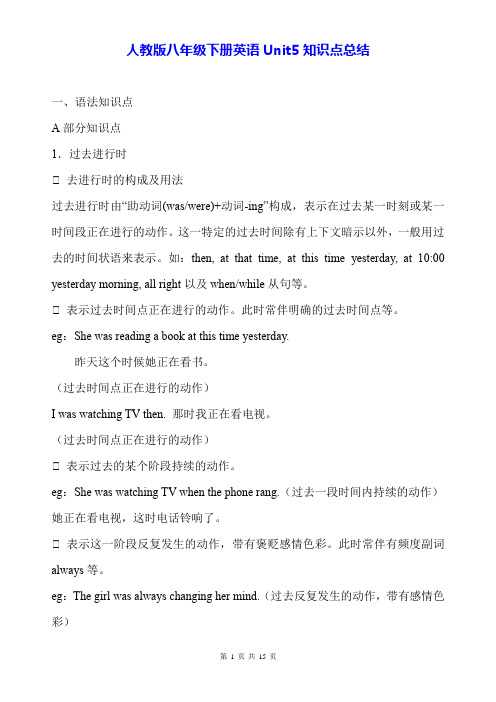
人教版八年级下册英语Unit5知识点总结一、语法知识点A部分知识点1.过去进行时❶ 去进行时的构成及用法过去进行时由“助动词(was/were)+动词-ing”构成,表示在过去某一时刻或某一时间段正在进行的动作。
这一特定的过去时间除有上下文暗示以外,一般用过去的时间状语来表示。
如:then, at that time, at this time yesterday, at 10:00 yesterday morning, all right以及when/while从句等。
❶ 表示过去时间点正在进行的动作。
此时常伴明确的过去时间点等。
eg:She was reading a book at this time yesterday.昨天这个时候她正在看书。
(过去时间点正在进行的动作)I was watching TV then. 那时我正在看电视。
(过去时间点正在进行的动作)❶ 表示过去的某个阶段持续的动作。
eg:She was watching TV when the phone rang.(过去一段时间内持续的动作)她正在看电视,这时电话铃响了。
❶ 表示这一阶段反复发生的动作,带有褒贬感情色彩。
此时常伴有频度副词always等。
eg:The girl was always changing her mind.(过去反复发生的动作,带有感情色彩)这个女孩老是改变主意。
❶ 表示过去动作延迟到以后发生,即用过去进行表过去将来,此类动词是一些位置的变化的词。
eg:He told me that he was going soon.(过去进行表将来)他告诉我他很快就要走了。
❶ 过去进行时的一般疑问句句型:Be(Was/Were)+主语+现在分词+其他?肯定回答:Yes,主语+be(was/were).否定回答:No,主语+be(was/were) not.eg:--Were you cooking at that time? 那时,你在做饭吗?--Yes, I were.是的。
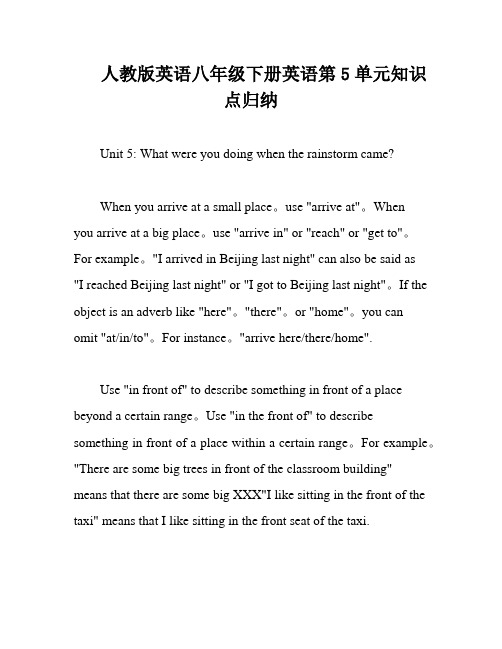
人教版英语八年级下册英语第5单元知识点归纳Unit 5: What were you doing when the rainstorm came?When you arrive at a small place。
use "arrive at"。
Whenyou arrive at a big place。
use "arrive in" or "reach" or "get to"。
For example。
"I arrived in Beijing last night" can also be said as"I reached Beijing last night" or "I got to Beijing last night"。
If the object is an adverb like "here"。
"there"。
or "home"。
you canomit "at/in/to"。
For instance。
"arrive here/there/home".Use "in front of" to describe something in front of a place beyond a certain range。
Use "in the front of" to describe something in front of a place within a certain range。
For example。
"There are some big trees in front of the classroom building" means that there are some big XXX"I like sitting in the front of the taxi" means that I like sitting in the front seat of the taxi.Take off" has three meanings。

八年级英语下册Unit 5 What were you doing when the rainstormcame?课本知识点集锦P33☆at the time of ... 当……的时候☆wait for 等待P34☆go off (闹钟)发出响声☆pick up 接电话☆take a shower 洗沐浴☆at that time 在那时P35☆feel like 感觉像是……☆make sure 确认;核实;确保☆beat against 敲击☆have fun 玩得高兴☆fall asleep 进入梦乡;睡着☆die down 逐渐变弱;逐渐消失☆wake up 睡醒☆break ... apart 把……折断/ 分开☆each other 互相☆in times of 在……期间;在……的时候P36☆take photos 拍照☆turn on 打开☆have a look 看一看P37☆by the side of 在……旁边☆walk by 路过☆make one’s way 前往;费力地前进P38☆be helpful for 对……有帮助☆the rest of 其余的……;剩下的☆in silence 沉默;无声☆take down 拆除;往下拽;记录☆at first 首先;最初P39☆tell the truth 说实话☆have trouble (in) doing 做……有困难P40☆point out 指出☆as well 也☆call out 叫喊;大声说话。
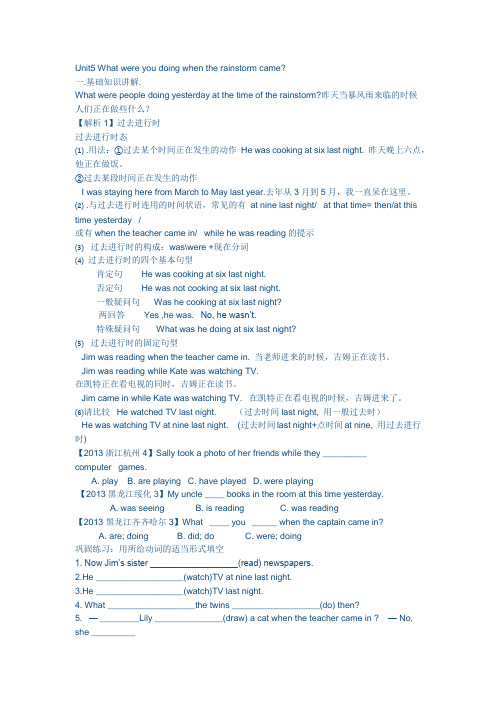
Unit5 What were you doing when the rainstorm came?一.基础知识讲解.What were people doing yesterday at the time of the rainstorm?昨天当暴风雨来临的时候人们正在做些什么?【解析1】过去进行时过去进行时态⑴ .用法:①过去某个时间正在发生的动作He was cooking at six last night. 昨天晚上六点,他正在做饭。
②过去某段时间正在发生的动作I was staying here from March to May last year.去年从3月到5月,我一直呆在这里。
⑵ .与过去进行时连用的时间状语,常见的有at nine last night/ at that time= then/at this time yesterday /或有when the teacher came in/ while he was reading的提示⑶过去进行时的构成:was\were +现在分词⑷过去进行时的四个基本句型肯定句He was cooking at six last night.否定句He was not cooking at six last night.一般疑问句Was he cooking at six last night?两回答Yes ,he was. No, he wasn’t.特殊疑问句What was he doing at six last night?⑸过去进行时的固定句型Jim was reading when the teacher came in. 当老师进来的时候,吉姆正在读书。
Jim was reading while Kate was watching TV.在凯特正在看电视的同时,吉姆正在读书。
Jim came in while Kate was watching TV. 在凯特正在看电视的时候,吉姆进来了。

unit5八年级下知识点Unit 5 八年级下知识点八年级下学期的 Unit 5 是关于过去完成时态的学习。
这个学习单元涉及了一系列的语法知识点,包括用法、结构和标志词等,下面我们逐一进行探讨。
一、用法1. 表示过去某个时间以前已经完成的动作或状态,常与过去时态连用。
例如:- By the time I got to the cinema, the film had started.- When we arrived at the restaurant, they had already finished eating.2. 强调“过去完成”的动作或状态,尤其是在时间、条件等表达中。
例如:- If he had studied harder, he would have passed the exam. - After he had finished his homework, he went to bed.二、结构过去完成时态的结构为 had + 过去分词。
例如:- She had finished her work by the time we arrived.- They had already left when we got there.三、标志词过去完成时态有一些常见的标志词,如:before, after, by, until, already, just, never, ever, recently, etc.例如:- I had never seen such a beautiful sunset before.- They had just arrived when the storm hit.以上就是八年级下学期的 Unit 5 关于过去完成时态的知识点了。
希望同学们能够认真学习和理解这些语法知识,加强自己的英语语法能力,提高英语水平。
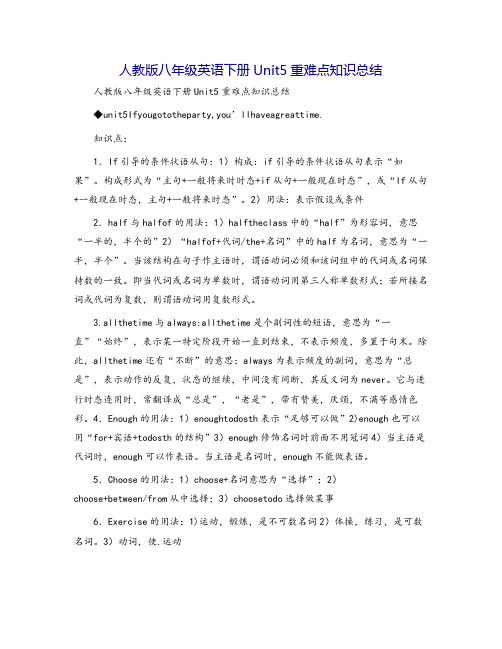
人教版八年级英语下册Unit5重难点知识总结人教版八年级英语下册Unit5重难点知识总结◆unit5Ifyougototheparty,you’llhaveagreattime.知识点:1.If引导的条件状语从句:1)构成:if引导的条件状语从句表示“如果”。
构成形式为“主句+一般将来时时态+if从句+一般现在时态”,或“If从句+一般现在时态,主句+一般将来时态”。
2)用法:表示假设或条件2.half与halfof的用法:1)halftheclass中的“half”为形容词,意思“一半的,半个的”2)“halfof+代词/the+名词”中的half为名词,意思为“一半,半个”。
当该结构在句子作主语时,谓语动词必须和该词组中的代词或名词保持数的一致。
即当代词或名词为单数时,谓语动词用第三人称单数形式;若所接名词或代词为复数,则谓语动词用复数形式。
3.allthetime与always:allthetime是个副词性的短语,意思为“一直”“始终”,表示某一特定阶段开始一直到结束,不表示频度,多置于句末。
除此,allthetime还有“不断”的意思;always为表示频度的副词,意思为“总是”,表示动作的反复,状态的继续,中间没有间断,其反义词为never。
它与进行时态连用时,常翻译成“总是”,“老是”,带有赞美,厌烦,不满等感情色彩。
4.Enough的用法:1)enoughtodosth表示“足够可以做”2)enough也可以用“for+宾语+todosth的结构”3)enough修饰名词时前面不用冠词4)当主语是代词时,enough可以作表语。
当主语是名词时,enough不能做表语。
5.Choose的用法:1)choose+名词意思为“选择”;2)choose+between/from从中选择;3)choosetodo选择做某事6.Exercise的用法:1)运动,锻炼,是不可数名词2)体操,练习,是可数名词。
Unit5 What were you doing when the rainstorm came?Section A1.过去进行时(1)用法①过去某个时间正在发生的动作He was cooking at six last night. 昨天晚上六点,他正在做饭。
②过去某段时间正在发生的动作I was staying here from March to May last year. 去年从3月到5月,我一直呆在这里。
(2)与过去进行时连用时间状语,at nine last night/at that time=then/at this time yesterday/或有when theteachercame in/ while he was reading的提示(3) 构成:was\were +现在分词(4) 四个基本句型肯定句He was cooking at six last night.否定句He was not cooking at six last night.一般疑问句Was he cooking at six last night?回答Yes, he was. /No, he wasn’t.特殊疑问句What was he doing at six last night?(5) 过去进行时的固定句型Jim was reading when the teacher came in. 当老师进来的时候,吉姆正在读书。
Jim was reading while Kate was watching TV. 在凯特正在看电视的同时,吉姆正在读书。
Jim came in while Kate was watching TV. 在凯特正在看电视的时候,吉姆进来了。
(6)比较He watched TV last night.(过去时间last night, 用一般过去时)(3)作连词so + adj./adv +that 从句so + 从句所以so that +从句以便,为了……12.I see . 我知道了。
(表示通过别人提醒而明白、了解)see sb. do sth 看到某人做某事see sb. doing sth 看到某人正在做某事13.either 也(1) also 也,用于肯定句句中,用在实义动词之前,系动词、助动词、情态动词之后。
(2) too 也,用于肯定句句末(3) either 也,通常放于否定句末14.while当......的时候15.make sure确信;确保make sure to do sth make sure ofPlease make sure to turn off the computer when you leave.Do you know the time of the train? You’d better make sure of it.16.work 运转;发挥作用The madicine doesn’t work.(1)工作,不可数名词He has too much work to do. 他要做的工作太多。
work →worker(2)著作或作品,可数名词,但多用复数He has read many of Hemingway’s works.(3)工厂,只用复数形式,但可表示单数意义The glass works(=factory) is [are] near the station. 玻璃工厂在车站附近。
17..beat 与win 辨析⎪⎪⎩⎪⎪⎨⎧⎪⎩⎪⎨⎧++比赛、游戏奖杯、奖牌战争获胜,赢得win 、、、、、、、、、、、、、、、beat We beat them by the score of 2 to 1. 我们以2:1赢了他们。
Which team won the football match? 哪个对赢了那场足球赛?18.heavily adv 在很大程度上;大量地;猛烈地 heavy adj. 重的(反) light形容雨雪下得大用heavily/hard19. against 倚;碰;撞(1)反对,反义词 for 。
若表强烈反对,一般用副词 stronglyAre you for or against the plan? 你对这个计划是赞成还是反对呢?(2)位置,靠着、顶着、The teacher’s desk is against the wall. 老师的办公桌靠墙放着。
He stood leaning against the tree. 他站着斜靠在墙上。
20. at first 首先;最初(1) at first = at the beginning 最初,开始 【强调在时间顺序或做某事过程等开始之初】(2) first of all 首先,第一 【表明陈述事情的重要性】21. fall asleep 进入梦乡;睡着(1) sleep =be in bed v 睡觉,指睡的动作状态(2) get to sleep =fall asleep 入睡,强调进入睡眠的状态(3)go to bed 上床睡觉,强调睡觉的动作He went to bed at ten last night , but he didn’t go to sleep until . He only fell asleep for 5 hours.29.get to 到达get →got→ gotten v得到get to +地点=arrive in/at +地点=reach+地点get on 上车get up 起床get used to 习惯于get along with sb 与某人相处融洽get together相聚Section B.1. happen 发生;碰巧(指偶然性发生)(1) happen v 发生没有被动语态,主语是物,强调某事发生的偶然性a. sth. happen to sb. 某事发生在某人身上What happened to you?=What was wrong with him?b. sb. happen to do sth. 某人碰巧做某事She happened ________(be) out when we called.(2)take place 发生,指事情有计划有安排地发生The sports meeting took place in our school last week.(3) It happened that…碰巧2.realize v 意识到(1) realize + n she didn’t realize her mistake.(2) realize +从句I didn’t realize that you were so unhappy.3.over= more than 超过4.make one’s way to … 在某人去……的路上(当后接地点副词时,应省略介词to)I’ll make my way home now.5.一段时间+ ago 之前,用于一般过去时plete v 完成adj. 完整的→completely彻底地;完全地① I ____________( complete) believe in you now. I think you are honest in the matter.② They ____________(complete) building the bridge late next year.7. the rest of … 其余的,剩下的, 做主语时,其谓语动词的数要与the rest of 修饰的名词一致。
The rest of meat goes bad. The rest of workers are still working hard.8.silence n 沉默→ silent 沉默;缄默;无声in silence 沉默地、无声地= silently keep silent 保持沉默9.remember to do sth与remember doing sth的用法区别。
(1) remember to do sth记得去做某事(此事还未做)Remember to turn off the light when you leave the room. 当你离开房间的时候记得关灯。
(2) remember doing sth记得做过某事(此事已做完)I remember turning off the light when I left the room.我记得离开房间时关灯了。
10.take down 拆掉;拆毁11.terror n. 恐怖→ terrorist 恐怖分子be full of terror充满恐怖art n. 艺术→ artist n.艺术家science n. 科学→ scientist 科学家piano n. 钢琴→pianist n. 钢琴家12. hardly 几乎不;绝不13. surprise v 使吃惊→surprising adj. 令人吃惊的→surprised adj. 吃惊的(1)be surprised to do sth 做某事很吃惊(2)to one’s surprise 使某人吃惊的是(3)in surprise 吃惊地(4)be surprised at 对……感到吃惊14.hear 听见,强调听的结果。
(1)hear sb. do sth听见某人做某事;(2)hear sb. doing sth听见某人正在做某事We can often hear some children play on the playground. 我们经常能听见一些孩子在操场上玩耍。
I heard my sister singing an English song in her room when I came back.hear也有听说之意,后接that引导的宾语从句。
(3) hear about听说=hear of,后面接词或短语。
I have heard about/of the story before. 我以前就听说过这个故事。
(4)hear from收到.......的来信;有.......的消息=get/receive a letter from.I haven’t heard from my mother for months. 我已经好几个月没有收到我妈妈的来信了。
15.true adj. 真的→ truly adv. 真地→truth实情;事实to be true to be honest = to tell (you) the truth老实说;说实话16. trouble n 困难;苦恼;忧虑(1) in trouble 处于困境中get sb. into trouble 使某人陷入困境(2)What's the trouble with you? = What’s the matter with you?= Wha’t wrong with you? 你怎么啦?(3)have trouble(in)doing sth 做某事有麻烦(4) have problem /difficulty/fun (in) doing sth 做某事有问题/困难/乐趣。